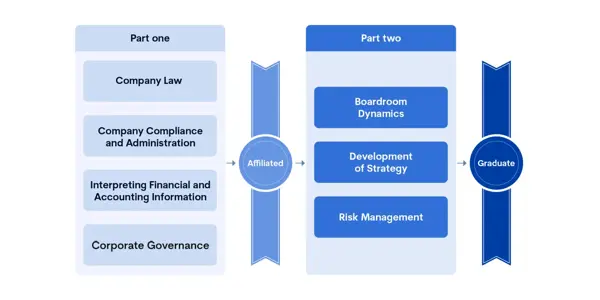Overview
This is our flagship qualification and the most common route to GradCG status and Chartered membership of the Institute. The programme covers seven subjects at two levels and can be completed alongside your full-time job.
Details
What is Chartered status?
Chartered status is the benchmark for company secretaries and governance professionals. It shows that you have the knowledge, skills and experience to take on a job with significant and wide-ranging responsibilities. In larger organisations, this may be within the secretariat or governance team or as part of a professional services team. In medium and smaller organisations, this may be in the sole governance or company secretarial role.

Who is it for?
Anyone is eligible to apply, but the programme rises to Level 7 (equivalent to postgraduate degree level) in the final stages. Our students range from entry-level to established professionals, some already working in governance as company secretaries and others transitioning from legal, financial, compliance and risk careers.
The entire programme can take up to five years to complete. However, we offer alternative entry routes for those with relevant education or professional experience. For example, a professional with five years of relevant experience may achieve the qualifying programme within one year via the fast-track professional entry route.
On successful completion of the programme you will receive Grad status which is your first step on the road to achieving Chartered status.
Full programme overview
The programme is divided into two levels, Part One and Part Two.
Students with a law, finance or governance background may be able to start at Part One at Level 6 (equivalent to final year undergraduate level). We highly recommend studying and taking examinations in the following order: Company Law, Company Compliance and Administration, Interpreting Financial and Accounting Information, Corporate Governance.
This will allow exposure to governance practice through experience as you progress within your career, making your preparation for the last module of Part One - Corporate Governance - more meaningful and consequently less challenging to study. Once you have completed Part One, you can move onto Part Two at Level 7 (equivalent to postgraduate degree level), developing commercial understanding through the study of risk, strategy and board dynamics.

Things to consider
- The time investment is significant.
- Up to 200 hours of study are required for the Foundation Programme.
- Up to 200 hours of study are required per module in Part One and Part Two.
- The work is challenging, rising to Level 7 (equivalent to a postgraduate degree).
- Our study materials and examinations are all in English (6+ on IELTS scale).
- Exam sessions are held in June and November.
- We recommend taking a maximum of 2 exams per session (4 per year).
These are not small considerations, but you are not alone. Becoming a student member with the Institute gives you access to expert support and guidance along with a range of other benefits.

The Syllabus
The aim of this module is to provide a thorough grounding in, and knowledge and understanding of, the legal framework governing certain business organisations, with particular focus on the registered company. Where appropriate, the module will also cover relevant corporate governance topics, and the relationship between company law and corporate governance.
The aim of this module is for students to develop their knowledge and skills to prepare for practice as a company secretary, ensuring that the company operates in accordance with good governance principles and the regulations of the jurisdiction in which it operates.
The aim of this module is to develop your knowledge of finance and accounting and the ability to use that knowledge to interpret financial and accounting information when providing advice to the board, or a similar decision-making body, in strategy development and/or decision-making.
The aim of this module is to provide advanced knowledge and key skills necessary for the company secretary or governance professional to act as chief adviser to the board and other stakeholders on best practice in corporate governance, and as the facilitator for systematic application across a wide range of organisations.
As the pace and volume of change in the environment affecting organisations in all sectors increases, company secretaries/governance professionals must seek to understand what is happening and play their part in determining the organisation’s response. All organisations are faced with the challenge of strategic direction either to grasp new opportunities or to overcome significant problems.
The aim of this module is to provide the elements, processes and techniques involved in the development and implementation of organisational strategy.
The aim of this module is for students to develop and extend their understanding of the discipline of risk management, including how risk management links to compliance management and complements effective corporate governance in organisations.
The aim of this module is to provide the advanced knowledge, understanding and skills needed for the company secretary/governance professional to support boardroom performance by enabling both effective individual behaviours and group processes.
Entry routes
No pre-study is required for direct enrollment onto the Qualifying Programme, however we recommend that students have studied to level 4 or above in a related field or have five years or more experience in a related role. Specific examples are:
- CGI Foundation Programme
- HND in Law or Accounting;
- HND or degree in Business Studies or Business Management;
- CGI Level 5 Diploma in International Finance and Administration (IFA);
- CGI Level 5 Diploma in Offshore Finance and Administration (DOFA); or
- an 'unrelated' degree (i.e. anything other than law, finance or business) and five years’ or more experience in a company secretarial or governance professional related role.
Law Degree Entry
If you have a degree in law, you may be exempt from the Company Law module.
Finance Degree Entry
If you have a degree in finance, you may be exempt from the Finance module.
MBA Entry
If you hold an MBA, you can start at Part One and can supply your transcript so we can assess you for any further exemptions.
Law Degree and Finance Degree Entry
If you have a degree in law and a degree in finance, you may be exempt from the Company Law module and the Finance module.
Professionals working in law or finance (for less than five years) may be eligible for exemption from two qualifying programme modules.
Law Professional Entry
If you are a lawyer working in a relevant role and a current member of one of the following professional bodies relevant to your jurisdiction, you may be exempt from the Company Law and Strategy modules:
- The Bar Council
- The Law Society
- Or equivalent, compliant with the Qualified Lawyers Transfer Scheme Regulations.
Finance Professional Entry
If you are a qualified accountant working in a relevant role and a current member of one of the following professional bodies relevant to your jurisdiction, you may be exempt from the Finance and Strategy modules:
- Institute of Chartered Accountants in England and Wales (ICAEW)
- Institute of Chartered Accountants of Scotland (ICAS)
- Institute of Chartered Accountants in Ireland (ICAI)
- Association of Chartered Certified Accountants (ACCA)
- Chartered Institute of Management Accountants (CIMA)
- Chartered Institute of Public Finance and Accountancy (CIPFA)
- Institute of Certified Public Accountants in Ireland (CPA Ireland)
As a qualified professional with more than five years post-qualifying experience (PQE), you can become qualified in a year or less. Our fast-track route recognises your knowledge and experience. It typically requires the completion of just two modules, Corporate Governance and Risk Management. Although, some professionals will be required to study Boardroom Dynamics as their second module.
The Chartered Governance Institute has a special arrangement with the Institute of Company Secretaries of India (ICSI) and the Institute of Chartered Secretaries and Administrators Nigeria (ICSAN), where members of these Institutes can study the qualifying programme and be exempt from certain modules.
The Institute of Company Secretaries of India (ICSI)
If you are a current Associate or Fellow of ICSI with a minimum of two years’ relevant experience/training, you may be exempt from up to four modules from the full qualifying programme. You would only be required to complete: Company Law, Corporate Governance and Risk Management.
The Institute of Company Secretaries and Administrators Nigeria (ICSAN)
If you are a current member of ICSAN and completed your final exam after November 2011, you may be exempt from five modules and would be required to complete: Corporate Governance and Risk Management.
How to study
Study with a registered tuition partner
We work with a variety of tuition partners and we strongly recommend our students take tuition. They can be used on a module by module basis and offer options that include distance learning and face-to-face classes. In addition to higher student pass rates, the benefits include:
- a structured programme of tuition;
- the ability to submit practice papers for feedback and guidance;
- fast, practical answers to any queries throughout the course; and
- regular contact with an expert tutor.
The cost of tuition is typically £350 – £600 per module depending on the tuition provider you choose and the services they offer.
Self-study
You prepare for each exam yourself, using the facilities provided as part of your student membership of the Institute. These include:
- access to past papers and suggested answers;
- access to module-specific webinars and recordings;
- a comprehensive study skills eBook; and
- study support webinars in areas such as planning your study and exam techniques.



